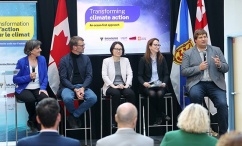Where the atmosphere and ocean meet
Environment, Climate
搁别蝉别补谤肠丑别谤蝉:听Dr. Rachel Chang
Dr. Rachel Chang is an atmospheric scientist. But you won鈥檛 find her with her head in the clouds. Her focus is on the area just above the ocean鈥檚 surface, tracking how the particles that come from its waters impact the air above.
She is working with the oceanographers contributing to the 果酱视频-led Transforming Climate Action research program focusing on understanding the ocean鈥檚 ability to absorb the world鈥檚 carbon, but her work investigates the question from above the waterline.
Dr. Chang says fog offers an ideal laboratory for studying the interplay between air and ocean, especially when it鈥檚 composed of droplets formed on particles released by the sea. She focuses on these droplets because each of them is like a little floating beaker where chemical reactions take place.
Further reading:听Where the atmosphere and ocean meet
Dangers of our digital exhaust
听
Researchers: Dr. Nur Zincir-Heywood
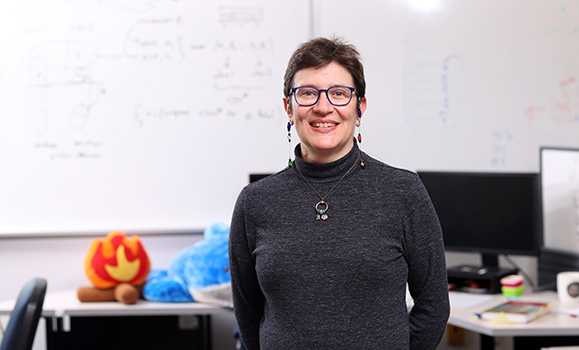
Internet-enabled devices listen to our every word and keystroke, but the data they collect and where it goes is not well understood. 果酱视频 computer scientist Dr. Nur Zincir-Heywood is getting a handle on the risks in a corporate partnership with engineering firm Calian.
In an era where internet of things (IoT) devices鈥攆rom virtual assistants and smartphones to coffee makers and washing machines鈥攁re ubiquitous, data exhaust is particularly troublesome. These devices are constantly listening, yet most of us have no idea how much data is being generated, how it is being collected, where it is going, and what it is being used for.
Recognizing that more research needs to be done to address these vulnerabilities, Calian partnered with 果酱视频 University on a three-year research project to study the data exhaust of consumer IoT devices and find听solutions to decrease risk.
Further reading:听Dal researcher investigates the dangers of our digital exhaust
听
Storms diminishing water supply on fabled island
Environment, Climate Action, Life on Land
Researchers: Julia Cantelon, Dr. Barret Kurylyk
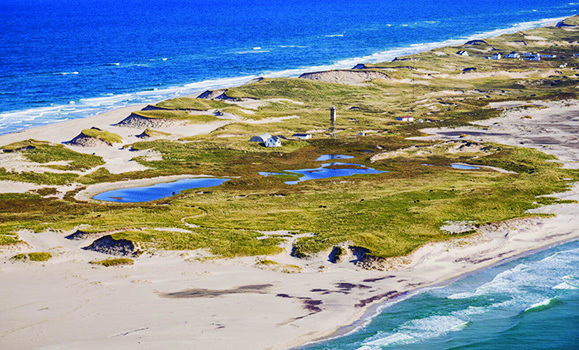
Storms that have buffeted Sable Island for centuries appear to be taking a toll on the slim piece of land that sits almost 300 kilometres off Halifax and in the path of powerful nor鈥檈asters.
Researchers have found that a vital part of the ecosystem that sustains life there is being compromised. A 果酱视频 team assessed the quantity and quality of the island鈥檚 fresh groundwater, which supports wild horses, plants, and birds.
They found that groundwater has been lost because of decades of dune erosion, seasonal waves, and hurricanes. When storms repeatedly batter the island, floodwaters can erode dunes and cause groundwater salinization to incrementally shift landward and听lead to long-term freshwater loss.
Further reading:听Sable Island鈥檚 shifting landscape offers insights into groundwater loss
听
Cigarettes + marijuana = increased emphysema risk
Healthy People, Healthy Communities, Healthy Populations
Researcher: Dr. Jessie Kang
Researchers have found that people who smoke both marijuana and cigarettes are 12 times more likely than non-smokers to have emphysema.
Dr. Jessie Kang, a cardiothoracic radiologist and assistant professor in the Department of Diagnostic Radiology, examined the chest CT images of four patient groups: non-smokers, cigarette smokers, marijuana smokers, and combined marijuana and cigarette smokers.
Preliminary findings suggest that those smoking both marijuana and cigarettes had more emphysema鈥攁 condition where the air sacs in the lungs are damaged鈥攖han non-smokers or those who smoke cigarettes alone. This can lead to breathing difficulties and other serious respiratory symptoms.
Combined marijuana and cigarette smokers were three to four times more likely to have airway wall thickening than non-smokers.
Further reading:听People who smoke both cigarettes and marijuana 12 times more likely to develop harmful lung condition
听
Less long COVID in children
听
Healthy People, Healthy Communities, Healthy Populations
Researchers: Dr. Jason Emsley; Dr. Stephen Freedman, Alberta Children鈥檚 Hospital; University of Calgary; McGill University; Universit茅 de Montr茅al; University of British Columbia; CHU de Qu茅bec- Universit茅 Laval; University of Ottawa; University of Manitoba; University of Toronto; McMaster Children鈥檚 Hospital; University of Saskatchewan; Newfoundland and Labrador Health Services; Queen鈥檚 University; Schulich School of Medicine and Dentistry; Public Health Agency of Canada

Children, it appears, experience long COVID at significantly lower rates than adults in Canada.
Researchers examined the proportion of children under age 18 who had symptoms that met the definition of long COVID, also known as post-COVID condition or PCC. The study involved follow-ups with 5,100 children and their caregivers at six and 12 months after they had been tested for SARS-CoV-2.
Overall, they found that very few infected children developed PCC, which involves symptoms that develop within three months of infection, are present at the time of follow-up, and affect everyday functioning. For example, just six of 1,152 children who tested positive for SARS-CoV-2 exhibited symptoms consistent with PCC at a six-month follow-up. At 12 months, eight of 1,192 children were deemed to have PCC.
The team also measured quality-of-life reductions for children who tested positive for COVID, finding no substantial differences from those who tested negative.听
Further reading:听Rates of long COVID significantly lower in children compared to adults
听
Shark finning rules may further decline of threatened species
Sustainable Ocean
Researchers: Dr. Boris Worm, Laurenne Schiller, Nidhi D鈥機osta; University of British Columbia; University of California
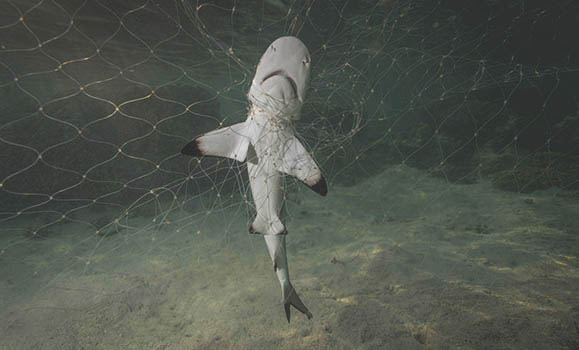
Anti-finning regulations meant to stem the loss of various shark species have done little to reduce their mortality.
A unique global assessment has revealed that, while some restrictions do work, sharks are actually being caught by coastal fisheries at increasing rates. Finning often involves slicing off the animal鈥檚 fin and discarding the body at sea.
An international team of researchers examined shark catches from 2012 to 2019, when many new anti-finning regulations were implemented, to see whether conservation measures reduced species losses.
They found total shark fishing mortality increased to 80 million from 76 million sharks per year even though protective legislation to reduce finning increased more than tenfold during the same time.
While finning prohibitions likely reduced shark finning at sea, they had little effect on mortality overall. In fact, they may have even increased catches, possibly by incentivising the full use of sharks and creating additional markets for shark听meat and other products.
Further reading:听Ground鈥慴reaking study reveals species still under threat from finning
听
Driving decarbonization for the global shipping industry
Researchers: Alumni Mo AlGermozi and Marciel Gaier
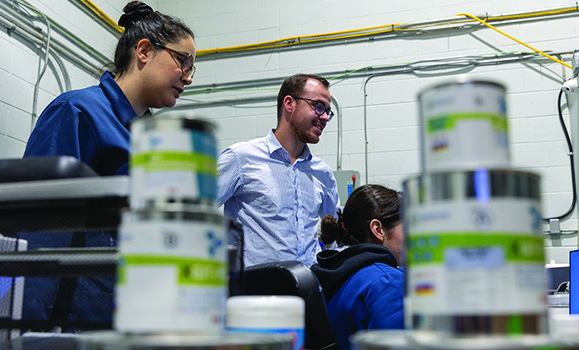
果酱视频 grads Mo AlGermozi and Marciel Gaier are upending the global marine coatings industry with , a business helping to decarbonize global shipping that was one of the first startups through the university鈥檚 .
Based on their research as graduate students, the founders of GIT have developed marine anti-fouling coatings that are ultra-smooth, durable, and capable of improving the fuel efficiency of commercial vessels such as cargo ships and tankers.
The company has secured investment from several strategic sources, including from the investment arm of the Stolt- Nielsen shipping company, and has grown to more than 30 employees hailing from nearly 20 different countries. It will soon boost its production six-fold by building a new 25,000 square foot, state-of-the-art facility in Dartmouth.
Further reading:听Driving decarbonization for the global shipping industry
This story appeared in the听DAL Magazine Spring/Summer 2024听issue. Flip through the rest of the issue using the links below.


